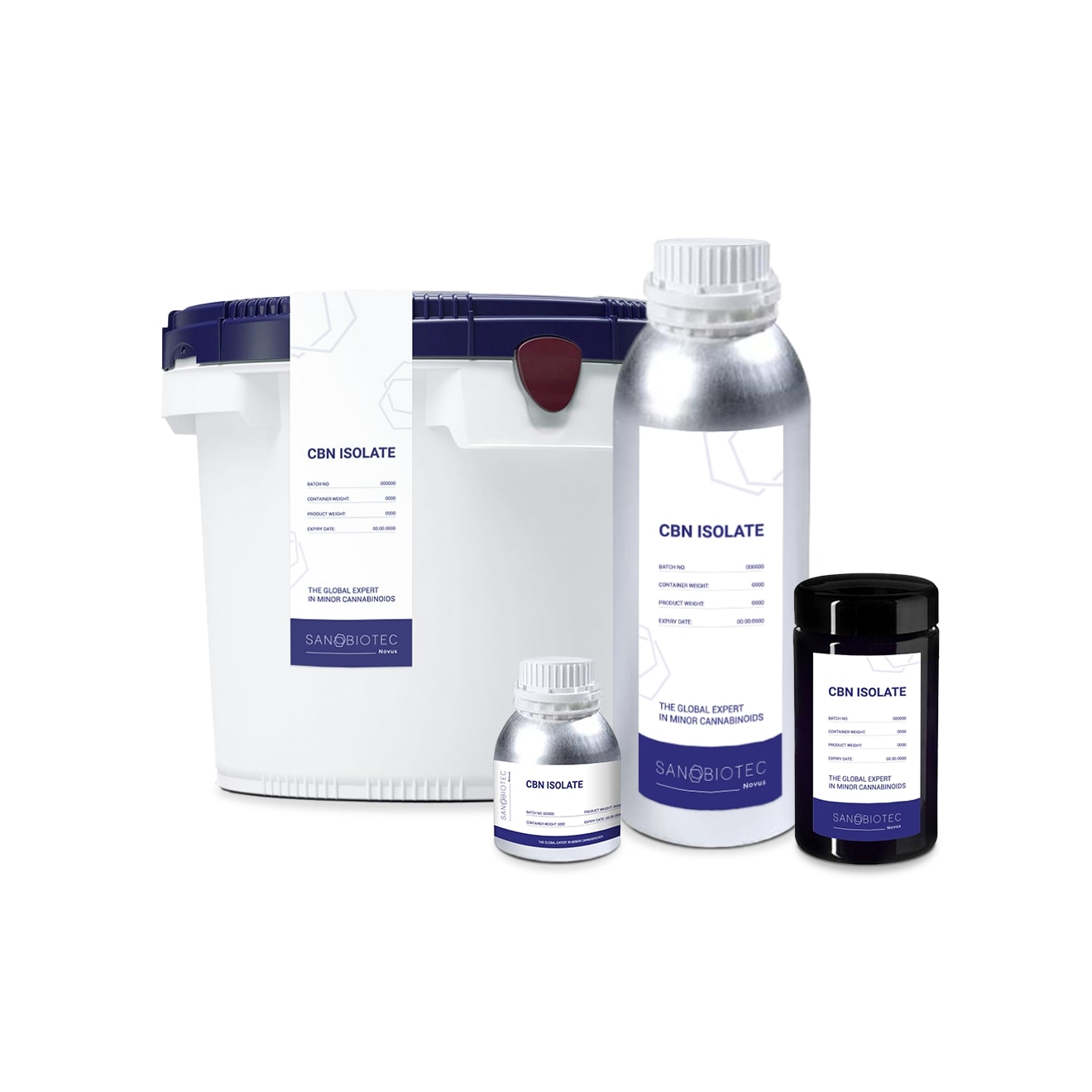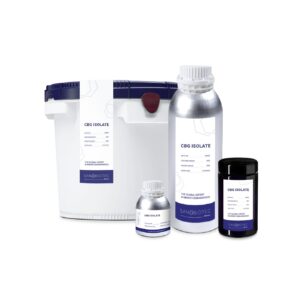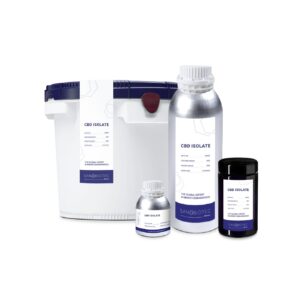Description
純度 98%以上
CBN(カンナビノール)は、植物性カンナビノイドの一種で、通常、カナビス種の麻の葉に極微量に含まれています。また、他のカンナビノイドにはない2つの芳香環が存在するため、保存性が高い化合物です。
当社のCBNは、天然のカンナビノイドから生成された後、最も厳しい純度基準を満たすように精製される、半合成的な方法で得られます。
| 製造方法 |
半合成 |
| 外観 |
白色パウダー |
| 形状 |
固形 |
| 純度 |
>98% |
CBNアイソレート
マイナーカンナビノイドの可能性がこれほどまでに広がっているのであれば、Sanobiotecも可能な限り研究・開発を続けていきたいと思うのは当然でしょう。
私たちがさまざまなマイナーカンナビノイドを扱っているのは、マイナーカンナビノイドについて、まだまだ学ぶべきことがたくさんあるからです。CBCやCBDVをはじめとするマイナーカンナビノイドは、治療的な意味で、分かっている以上に恩恵をもたらす可能性があります。私たちはただ、それらをもう少しよく知る必要があるのです。
そこで、もう一つのマイナーカンナビノイドであるカンナビノール(CBN)を紹介しましょう。
CBNアイソレートとは?
カンナビノールは、マイナーなカンナビノイドでありながら、多くの可能性を秘めています。
このカンナビノールは非毒性化合物であり、CBNカンナビノイドの研究は、さまざまな用途や目的に対して効果的であることを証明する点で、まだ表面しか見ていません。
このマイナーなカンナビノイドであるCBNについて、最近の研究では、以下のような効果が期待されています:
抗菌作用:CBNは非常に強力な抗菌作用を持つ可能性があり、CBNアイソレートとCBN蒸留液の両方がこの目的のために使用される可能性があることが研究されています。
痛みの緩和 : カンナビノール単体を痛みの緩和に使用する場合、最終消費者にとって使いやすさが非常に重要であるため、CBNパウダーなどの選択肢を検討し、CBN薬として服用する方法を研究することが重要である。また、CBNは30~40分以内に効き始めると言われており、痛み止めとしての応用はエンドユーザーにとって大きなメリットをもたらす可能性があることも指摘しておきたい。
睡眠導入剤としての効果 : CBNは睡眠導入剤として有効であることが示されており、消費者が必要な睡眠を取るのを助ける。睡眠は時に最良の薬となるため、この副次的な効果は非常に大きいとされています。

最近の関連研究
このカンナビノイドが関与している最近の研究分野のまとめです:
筋萎縮性側索硬化症(ALS、ルー・ゲーリッグ病)
アルツハイマー病
注意欠陥多動性障害(ADHD)
歯の健康
食欲不振
神経補語
発作
一般消費者がCBNアイソレートを購入しようとしているとき、彼らはCBN販売またはCBN単体販売の広告を見ますが、最大の利点が達成されようとしている場合、CBN原料は常に最高品質であるべきです。
しかし、Sanobiotecは、マイナーなカンナビノイドの謎を解き、主要なカンナビノイドであるCBGやCBDと一緒に主流になるよう支援しようとしています。
Sanobiotecでは、これらのマイナーなカンナビノイドを使用することで得られる利益を最大化することにのみ関心があります。
マイナーなカンナビノイドから大きな効果を得ること、そしてその方法を私たちは知っています。
私たちのチームは、これらの化合物をできる限り理解し、人々がその効果を最大限に発揮できるようにすることに全力を尽くしています。
潜在能力を引き出すには、適切な鍵が必要ですが、Sanobiotecにはその鍵が揃っています。
This is a summary of the research interests for each cannabinoid being discussed. These statements have not been evaluated by regulatory bodies such as Food and Drug Administration. This ingredient is not intended to diagnose, treat, cure or prevent any disease. Sanobiotec has provided this summary solely to provide the reader with information on the types of studies being conducted on cannabinoids.
Sources:
1. Aiken C et al. A cell‐based screen for drugs to treat Huntington’s disease. Neurobiology of Disease, 16(3), 546–555 (2004).
2. Appendino G et al. Antibacterial cannabinoids from Cannabis sativa: a structure-activity study. J Nat Prod 2008 Aug; 71 (8): 1427-30.
3. Dawidowicz A L et al. CBG, CBD, Δ9-THC, CBN, CBGA, CBDA and Δ9-THCA as antioxidant agents and their intervention abilities in antioxidant action. Fitoterapia 2021 Jul; 152:104915.
4. De Petrocellis L et al. Effects of cannabinioids and cannabinoid enriched Cannabis extracts on TRP channels and endocannabinoid metabolic enzymes. Brit J Pharmacol 2011 Aug; 163 (7):1479.
5. Farrimond JA et al. Cannabinol and cannabidiol exert opposing effects on rate feeding patterns. Psychopharmacology 2012; 223: 117.
6. Hergenrather J et al. Cannabinoid and terpenoid doses are associated with adult ADHD status of medical cannabis patients. Rambam Maimondies Medical Journal 2020; 11(1) online.
7. Marsicano G et al. Neuroprotective properties of cannabinoids against oxidative stress: Role of the cannabinoid receptor CB1. Journal of Neurochemistry, 80(3), 448–456 (2002).
8. Schubert D et al. Efficacy of cannabinoids in a pre-clinical platform for Alzheimer’s disease. Molecular Neurobiology 2019; 56: 7719.
9. Stahl V et al. Comparison of Efficacy of Cannabinoids versus Commercial Oral Care Products in Reducing Bacterial Content from Dental Plaque: A Preliminary Observation. Cureus 12(1): e6809, January 2020.
10. Thornton C et al. Cannabis constituents reduce seizure behavior in chemically-induced and scn1a-mutant zebrafish. Epilepsy Behav, 2020 Sept; 110:107152.
11. Weydt P et al.Cannabinol delays symptom onset in SOD1 (G93A) transgenic mice without affecting survival. Amyotrophic Lateral Sclerosis 2005 Sep, 6(3): 182-184).
12. Wong H and Cairns BE. Cannabidiol, cannabinol and their combinations act as peripheral analgesics in a rat model of myofascial pain. Arch Oral Biol 2019 Aug; 104: 33-39.
13. Zhong, N. et al. Cannabinol inhibits proliferation and induces cell cycle arrest and apoptosis in glioblastoma, hepatocellular carcinoma and breast cancer cells. University of Lethbridge Msc Thesis (2020).





